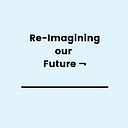Re-Imagining Weddings
Shimmery costumes, world class decor, an elaborate dinner spread, loud music, lots of dancing and lots and lots of people — this is what weddings meant to us while growing up.
Being in India, famous for the Big Fat Indian Wedding experience, where people shell out a huge part of their savings and sometimes even take loans to conduct this socially binding celebration, weddings are all about their extravagance. It is astonishing to see how such a personal, sacred process has now transformed into the largest industry in the country.
The Wedding — undoubtedly one of the most significant milestones in a couple’s journey — is nothing but a celebration to mark the sacred moment of the two people committing to each other for life. It is ironic that the celebration has now become bigger than the commitment. Amidst all the pomp and show, the real essence of weddings, the ceremony itself has taken a back seat. It is reduced to something that is done as a formality because that is how it has been happening since ages. There is no active, mindful participation in the process. In fact, even the vows are the same as they used to be generations ago. How can promises you make to your life partner as a part of a sacred ceremony be dictated by anyone other than yourself?
We believe that ceremonies are powerful tools to transcend from one phase of life to another. But, it works only if you put your heart and soul into it. When conducted with utmost consciousness, they become channels to manifest your declared intentions.
We imagine a future where the ceremony or the rituals reclaim the focus of the wedding festivities, or of any celebration for that matter, where couples will tie the knot in a ceremony that is a true reflection of their relationship, a ceremony that they can truly connect with, a ceremony that fosters connection and that in every sense, will be their own.
From the perspective of someone growing up , and attending weddings in the US, I (dan) always found myself questioning the rituals that are commonly associated with weddings. Usually, it is super expensive for the couple getting married: fancy invitations, event hall, dress/tux, hair/makeup, fancy dinner etc. At the event itself, the bride and groom are usually the most stressed, having to say hello to hundreds of people, but not really having the time to genuinely be with anyone.
What would a regenerative wedding look like? A multi-day festival? Open invitations and small events for people to reflect, learn something new, share skills etc.? Spaces for the bride and groom to connect deeply with their loved ones? Live music each night, maybe from a friend’s band and/or an open mic for the collective group of invitees? Crowdfunding, or small contributions from guests, like a grand potluck and skill sharing event? Instead of buying new gifts (all those bread makers that get used once or twice!) what if people gave their second-hand appliances or offered time or service or invitations for a shared experience etc.?
Similar to India, less and less people are genuinely religious in the USA, but most all wedding ceremonies are religiously focused? Can you imagine making your own guidelines? Does it have to be ‘Till death do us part’? Could it be open and flexible? Or at least, could there be more than one option? Times have changed, with it divorce rates have skyrocketed. Is this a bad thing? Or is it a sign of people starting to become freer, more independent? Maybe both?
Prior to living in India, I thought arranged marriages were inherently bad. It was interesting talking to urban Indian youth, who were given the options by their parents to ‘find love’ or have an ‘arranged marriage’. It was surprising for me to hear many young people opt for the arranged marriage. Listening to their rationale, opened me up to the idea. There is a lot of pressure finding a ‘true love’. And, often you meet that true love out of passion and shared interest. In some cases, after ten years you realize that most of the passion and shared interests are gone. With the arranged marriage, it seems different, where you join in union and grow to love and appreciate each other, and find shared passions.
Like most things, I have come to realize that there is no ‘right’ or ‘wrong’ way (save extreme circumstances) but there are many ways — Love Marriage, Arranged Marriage, and even No Marriage — and within each of these there are many ways to realize and carry out that union, not just one.
Lead Author: Sonal Parakh (first 6 paragraphs)
Conscious Connections is our initiative to ignite the spark that leads the society towards this change. We offer services to design meaningful, personalised ceremonies for weddings, anniversaries, baby showers etc that are heartwarming and focuses on the couple and their relationship. We strive to design ceremonies that become an unforgettable experience for everyone who participates and witnesses them.
instagram — consciousconnections22
e-mail — consciousconnections22@gmail.com
Anchor Author: Daniel Rudolph
Daniel Rudolph is interested in exploring alternative, experiential learning opportunities for people of all ages. He is passionate about forming community, and building public spaces for meaningful, transformational gathering. Currently he is spending a lot of his time learning juggling and facilitating gatherings. He also enjoys writing and sharing poetry. Daniel is a very curious and playful person and is always open for creative collaborations.
